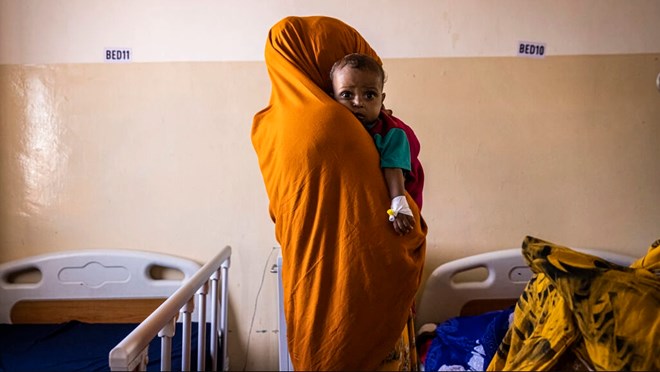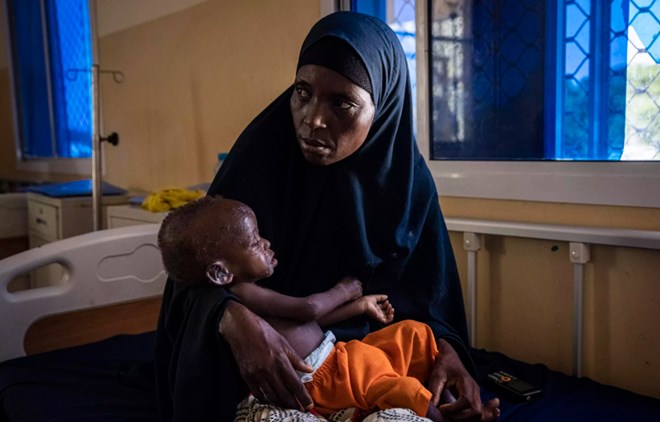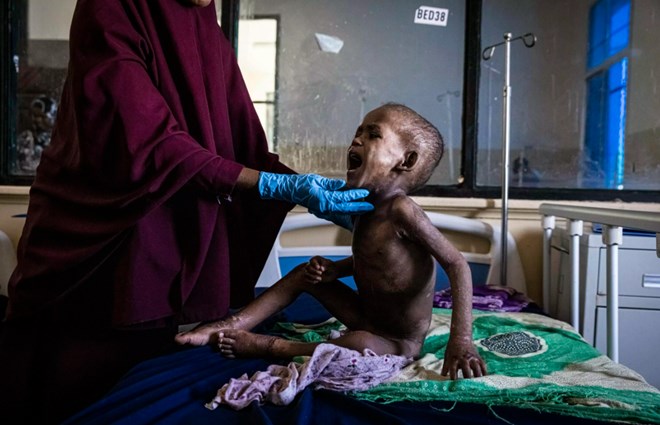
Friday June 10, 2022

Banadir Maternity & Children Hospital has become ground zero for the starvation crisis sweeping across Somalia Ed RAM AFP
Arbay Mahad Qasim has already lost two children to a vicious
drought, and now the Somali villager fears she could lose a third as her
malnourished toddler Ifrah awaits treatment in a Mogadishu hospital.
Barely out of her teens, Qasim is among dozens of weary parents
crowding Banadir Maternity & Children Hospital, which has become ground
zero for the starvation crisis sweeping across Somalia as a record drought
grips the Horn of Africa.
Entire villages have been forced to uproot their lives and
flee their homes after poor rainfall destroyed crops and killed livestock.
When the rains failed for a fourth consecutive season last
month, UN aid agencies and meteorologists warned that a famine was looming in
Somalia, Kenya and Ethiopia.
But for many Somalis like Qasim, who has been surviving on
government handouts for the past few months, catastrophe has already struck.
Two of her children died of hunger in the last 18 months.
When two-year-old Ifrah's tiny body began to swell, showing symptoms
of severe malnutrition, Qasim wasted no time, spending a day travelling to
Mogadishu from her village in the southwest in a desperate bid to save her
youngest child's life.
'Worst conditions'
The Banadir facility is packed with parents fearing the
worst for their children.
Some have walked for days to find help, carrying their sick,
skeletal toddlers on their backs.
Many told AFP they had never endured a crisis of such
terrifying magnitude, echoing the warnings of climate scientists who say the unprecedented
drought is the worst seen in four decades.
"The crops failed. We lost the livestock. The river
dried up," said Khadija Mohamed Hassan, whose 14-month-old son Bilal is
among those admitted to the Banadir facility.

Meteorologists have warned that the October-November monsoon could also fail, plunging the region into further turmoil Ed RAM AFP
"I am 45 years old and I have never seen such a
devastating drought ever in my life. We are living in the worst conditions of
our time," she told AFP.
Health workers are already overwhelmed, with doctor Hafsa
Mohamed Hassan telling AFP that the number of patients arriving at Banadir's
stabilisation centre for malnutrition had trebled since the drought began,
leading to a shortage of beds on some days.
"The cases we are receiving include children with other
health complications like acute measles and others who are in a coma due to severe
malnutrition," she said.
The situation is at a tipping point, said Bishar Osman
Hussein of the non-profit organisation Concern Worldwide, which has been
supporting the Banadir centre since 2017.
"Between January and June this year, the number of children
admitted at the Banadir Hospital stabilisation centre with severe malnutrition
and other complications has increased from 120 to 230 per month," he told
AFP.
Meteorologists have warned that the October-November monsoon
could also fail, plunging the region into further turmoil.
'Cannot wait'
Conflict-wracked Somalia is particularly ill-equipped to
cope with the crisis, with a grinding Islamist insurgency limiting humanitarian
access to parts of the country.
Thousands of miles away, the war in Ukraine has also had a
devastating impact on the lives of Somalis, with food prices soaring and aid in
short supply.
Some 7.1 million Somalis -- nearly half the population --
are battling hunger, with more than 200,000 on the brink of starvation, the UN
said this week.
Meanwhile appeals for aid have largely gone unnoticed, with
agencies raising less than 20 percent of the funds needed to prevent a repeat
of the 2011 famine that killed 260,000 people -- half of them children under
the age of six.
"We cannot wait for a declaration of famine to
act," El-Khidir Daloum, the World Food Programme's country director in
Somalia, said in a statement Monday, warning of a race against time.

Aid agencies have raised less than 20 percent of the funds needed to prevent a famine Ed RAM AFP
As humanitarian aid falls short, Somalia's newly elected
President Hassan Sheikh Mohamud has urged Somalis to help their fellow
citizens.
"Anyone with a plate of food in their table today must
think about the child who is crying somewhere because of hunger and help them
in any way possible," he said during a recent visit to a camp housing
drought-displaced communities.
Back at Banadir hospital, Khadija Mohamed Hassan anxiously
keeps vigil over little Bilal, his bony body a mess of tubes and bandages.
"We have been here for 13 days, and he looks better
now," she said.